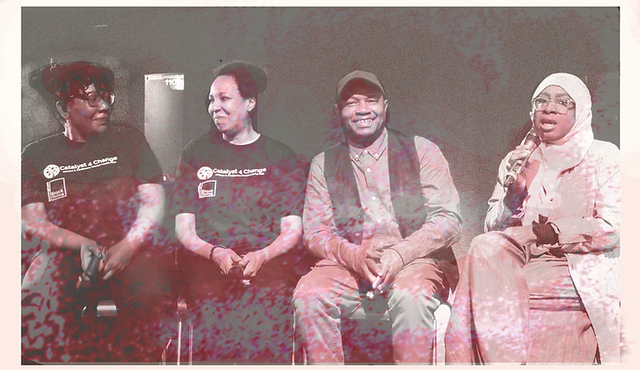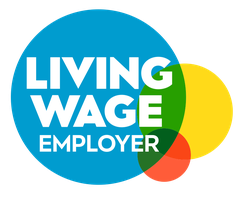Galvanising community action through a Citizen Assembly

We at Place Matters chose to share this story because it illustrates…
- How an assembly can create the power for building a movement for local change by creating space for open conversation with the local community
- Community-led research, directed by the needs for change. Openly defining, collecting, owning and making sense of data to inform people of power and funding decisions.
- How a partnership between a local and national organisation enabled the Black community to influence change in the local system and how they engaged local decision-makers.
Who are Black Thrive, and the core team behind the Community Assembly?
Black Thrive started in Lambeth in 2016 coming out of a commission looking at the death of Sean Rigg a Black musician. Black Thrive Lambeth was set up as a partnership with key organisations and it became clear that the system must not just focus on mental health when it is at an acute stage, but all the factors leading to the incidence of adverse mental health. In 2020 they founded Black Thrive Global to extend the work in Lambeth to other places starting with Birmingham and Haringey, supported primarily by the National Lottery Growing Great Ideas programme and also by Lankelly Chase Foundation. They chose to work in these localities because they were aware of local partner organisations that were Black-led and working on similar missions around improving mental wellbeing and centring Black communities in that work. The partnership between Black Thrive Global and the three localities (Lambeth, Haringey and Birmingham) is referred to as the Thriving Futures Collective.
The core team behind the Community Assembly
Sandra Griffith, Business and Partnerships Development Manager at Catalyst4Change CIC; Tamanda Walker, Qualitative Research Lead at Black Thrive Global; Celestin Okoroji, Head of Research Black Thrive Global; Onika Winston, Programme and Partnerships Manager; Michael Little, CEO Ratio; Lela Kogbara, Director of Black Thrive Global
What is a Community Assembly?
The Thriving Futures Collective is funded by the National Lottery Growing Great Ideas program and one of the themes of the Collective is Black communities driving change. A key part of this is the concept of co-learning, how we learn together, and share our learning as we go on this journey over the next 10 years.
Inspired by the citizen assembly model, the Thriving Futures Collective devised the concept of community assemblies: get-togethers to find creative ways to consult, engage and involve Black communities across all their work as they go on the journey of change. The assemblies bring together people from the Black communities and allies with system players who have the levers to make change happen.
The Thriving Futures Collective committed to having assemblies in all their localities in the Growing Great Ideas programme. There are two formats of assemblies; small and large. Large Assemblies — are where they gather views, and share ways forward. Smaller assemblies are focused on particular groups and specific issues and where there are intersections of those issues like gender, faith, and LGBTQ+.
Who came: Black-led organisations; Maternity engagement action; Grass root organisations; CEOs; business owners; statutory sector people mental health trust and public health; Thriving Futures family from Lambeth, Global and Harringay.
The Assembly was designed to bring together a range of people to have conversations about the health inequalities in African and Caribbean communities. The Assembly was structured to enable a dialogue between all participants and whilst there were speakers they were there to stimulate the conversation. The focus of the assembly was to explore challenges and opportunities to change the healthcare system for African and Caribbean communities and to share learnings, expertise, strengths and assets amongst the different stakeholders.
For Black Thrive and Catalyst 4 Change the Assembly was a chance to show the team is from the community with living and lived experience. This was important to give a sense of authenticity and commitment for the long term. What they wanted to do is help local people to understand the reality of doing systems work — it’s messy, challenging and long, but brings the community into the journey. The approach to the Assembly was designed to be as inclusive as possible, recognising and valuing the assets, strengths and expertise in the community.
What Made the Community Assembly Successful?
Opening up a space for collective action
All the key players were there from the statutory and community sectors. The community itself was present and owned the conversations. There were sensitivities about Black Thrive stepping into the space in Birmingham.
Catalyst4Change — a West Midlands-based partner in the programme, came in and opened the Assembly space with care and humility, setting an environment that aided collaborative conversation. It was incredibly powerful to have a whole room of Black leaders, it felt like a warm embrace — everyone united for the need for change and the want to do something to bring about change. There was a sense that collectively we might be able to do something more important. There was a will and generosity from everyone, and an appetite, and desire for something different.
Curating a genuine dialogue
It is important to give care and thought to what you want people to take away. Too many events are led by those holding power giving information to people but without the space to make sense of or question what they are being told or for those in power to listen. They chose to structure the event as a dialogue that included systems leaders but as an equal presence at the event.
Being accountable to the community
The plan is to use assemblies as a means of holding the programme to account for how they acted on the priorities identified by the communities.
Thinking about who isn’t in the room
During the 12 month preparation, the Thriving Futures Collective built relationships with the Black community, which made them aware of communities absent from the Assembly. For future work, the collective will put a concentrated effort on engaging the communities who were not present or under represented, such as LGBTQ+, Muslim communities, and Migrant communities.
The assembly reflects the ethos and culture of those facilitating it
Because the assembly event reflected the ethos of the partnership and the way the team were working with the community more broadly, it embodied authenticity.
A mixture of deep planning and adaptability to read the room
The success of the event in Birmingham was a combination of deep planning around the experience they wanted to create and their approach to adapting the format on the day in response to the energy and momentum in the room. Having clarity about what they wanted to achieve upfront gave them the confidence and consensus to respond flexibly on the day.
A collective sense of hope in the power of the community
An important learning for Black Thrive going forward is to let go of control, to work emergently by trusting the community. It is not about Black Thrive owning the change, but to create the conditions that enable local people to come together and create change. What the assembly in Birmingham achieved, which felt different from many other approaches to engaging people around change, is that it created a collective sense of hope in the power of local people to bring about change.
How data was brought into the Assembly and the effect it had
The Black Thrive Global research team
Black Thrive Global has prioritised developing a data research capability focused on struggling for racial equality.
“Everyone needs to play the role they can play in the struggle — we are struggling for racial equality. We are fighting against racism. Research might be the piece of the puzzle that underpins our greater work. Use research to help us move to a society we want to.”
The problem Black Thrive are tackling is that research is often done by people not part of the community they are researching. Between data and knowledge lies interpretation, and who does this interpretation has an impact on the knowledge generated by the data. Too often data has been interpreted by people who are not part of the community being researched.
They shared data on Stop and Search at the Assembly. The data validated and empowered what people were experiencing and the dialogue that followed gave space for people to share their experiences and for the system’s leaders to hear what that has meant for people.
Re-interpreting existing data
The research team also gathered data collected by the system from Black mental health users and looked at how it had been interpreted and analysed. As people outside the local system and as Black researchers they were able to see things that had not come out of prior analysis. One of the things they found looking at the data on focus groups was the level of anger about data being extracted from them, often via Black-led organisations commissioned to do the work, but who were not empowered to be accountable for the response to the data.
The data and the new interpretation that the Black Thrive Global team brought to the assembly, showed the power of data for influencing change. Power for change is created when data is owned by and put into the service of helping Black people rather than the system that collects it. This had a galvanising effect on people at the Assembly and initiated an impetus to act, which surprised the team and has accelerated the pace of the programme.
Working with data as a communal process is a cornerstone in the way Black Thrive Global practices support change in communities. Importantly, it should be seen as a shared endeavour that includes other actors in the system and local people. That is critical to the sustainability of the work.
Opening up radical possibilities for change
The discussion of the data shared in the session around stop and search, mental health and maternity services opened up radical ideas that challenged the fundamental principles and model of the current systems. For example when discussing data around Black mental health, there were ideas on shifting to family centred models rather than clinically-led.
By connecting data with the experiences and concerns of local people, new insights and opportunities were able to surface on how the system can work better for people in the context of their lives.
Research that is accountable for change
As Black Thrive explores the role of research and data as agents for change, they are creating an agenda to achieve systems change whilst being accountable for what the research achieves for the community.
“It’s a work in progress, we are learning as a research team what it means to respond to this, and what it means to genuinely, collaboratively build a research agenda. Not only research but research that is attached to system change efforts. So often research is done and data is collected for the sake of collecting it. But no one talks about the second piece — what’s the point of the data if it doesn’t change anything? What’s good about this dynamic we are building with the community is they are holding us accountable for that piece which is essential. We are learning. It’s not static. ”
Key Learning for Practitioners
The research agenda should be led by and for the community, rather than collected to meet the agenda of a commissioner or funder
The leaders of change are people invested in the change.
It is so often that Black people are in the minority when working with the system to make change happen. In Birmingham nearly everyone in the room was Black. It meant that those leading the change had similar experiences to those whose lives they are looking to change.
They own the research and evidence agenda. They focus on what is important for Black people to know and communicate. It is not for someone else or working toward an agenda defined by anyone else.
The research needs to align to a model of rigorous systems change — not data for its own sake. It has a clear purpose to achieve change.
Ensure that the research by values and learns from what has come before.
Mapping assets and learning from successes
Prioritise time for mapping the assets and strengths in the communities — spend time understanding what conversations have been had about race and inequality- what organisations are paying attention — learning what’s worked well and what can be built on. Learn from Black people that are doing well and thriving.
"Let go of power and be prepared to take risks"
Let go and be of service: a combination of expertise, power and humility
Be in service to the community by letting go of your power. There is a need to combine expertise and power with humility.
Hold your expertise lightly so it doesn’t close down or dominate the shared endeavour, but tightly so it serves the work and enables constructive challenge of things holding people back.
The resources, capacity and agency for change exist within individuals and communities. Structural barriers block people accessing and utilizing their full capacities. People that have power, resources or capital, should share their advantages to support the community in their journey for change.
If you want to usher in new ways of doing things, be prepared to take risks, and to get it wrong — the communities know the solutions, they know their issues best and they often have the best ideas and solutions.
Believe local people will value and engage with data as a tool for change
Authenticity and co-learning
Show a commitment beyond money- a genuine commitment to the thing itself — the authenticity of the intention and moral purpose. If you as a team do not have an authentic commitment to the cause and whatever it takes, the community will not trust you.
Co-learning — Be prepared to learn together and be open-minded to the uncommon solutions that might come up. Put the time into creating the strength of a relationship that allows people to both challenge and support each other.
Relationships
How do we have open and honest conversations? Put time into building relationships, to build trust for people to work together constructively.
Effort + Time = Trust
Have a good heart.
What have the team learned about managing systems change?
The system comes to our table on our terms
By convening a group of community leaders, the system took our convening power seriously, a lot of learning has happened since. The system needs to come to our table prepared to share power. Attendees wanted to know if the system listening, is changing from talking at us. System change learning is us being together we are shifting the balance of power.
Leverage over the system depends on the rigour of the analysis that evidences the need for change
System change work, community power
System change work depends on the rigour of analysis to exert leverage on places. Begin by understanding how the system works, then work to unlock the power of the community to change it through community organising and development. The Assembly created an obligation for those that convened it to respond to the energy for change and to be accountable to the community for enabling that change.

